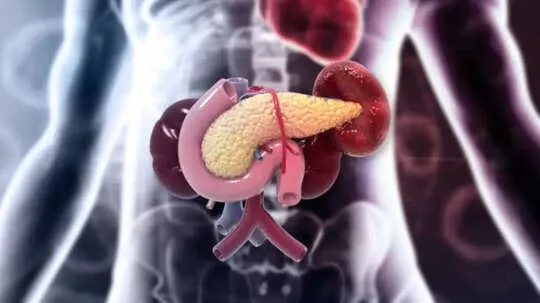Scientists Discover New Early Warning Sign for Pancreatic Cancer; Here’s What You Should Not Miss
admin | July 29, 2025 10:22 PM CST

Pancreatic cancer is also known as the silent killer for a good reason. By the time most people experience symptoms, the disease has progressed to an advanced stage where treatment options become very limited.
Across the world, it is the tenth most common cancer and ranks seventh in cancer deaths. The incidence and mortality rates are higher in males than in women and increase with age, especially in those over 65.
Doctors say pancreatic cancer is considered deadly due to its tendency to be diagnosed at a late stage, its aggressive nature, and the lack of effective treatments for advanced cases. The most common form, pancreatic ductal adenocarcinoma, or PDAC, develops in the pancreatic duct, which is a tube that connects the pancreas to the small intestine.
When tumours form here, they block the flow of digestive enzymes, leading to energy metabolism problems that leave patients feeling chronically fatigued. However, these symptoms are mostly subtle and can be easily dismissed or attributed to other causes. However, that may soon be reversed, as scientists in the US have developed a biological early warning system that signals the presence of precancerous pancreatic cells.
What is the new test to diagnose PDAC early?
According to experts, an unexpected source for early PDAC detection has been found - fecal samples. Scientists are discovering how the poop can lead to an early detection of cancer. It happens because your gut, home to trillions of bacteria, starts to outnumber human cells by around 40 trillion to 30 trillion. These microscopic residents form complex communities that can reflect the state of your health, including the presence of disease.
Experts say PDAC develops in the part of the pancreas that connects to the gut, and most people have regular bowel movements. Stool samples provide a practical, noninvasive window into what is happening inside the body.
The study, conducted by the UC San Diego team, is focused on a protein known as STAT3 or signal transducer and activator of transcription 3, which gets activated under stressful or inflammatory conditions in your body. Once turned on, it triggers a chain of biological reactions that help tumours grow, adapt, resist treatment, and spread.
Scientists say that under low oxygen conditions and inflammation, both of which are common in cancer, STAT3 activates a gene known as Integrin β3 (ITGB3) in pancreas cells, which speeds up tumour growth and helps cancer spread faster. But when researchers blocked STAT3's pathway, they were able to delay the development of tumours, offering a potential new direction for future therapies.
According to experts, the STRESS UP could play a role at every stage of pancreatic cancer, from the earliest precancerous lesions to fully drug-resistant tumours and even those that have spread to other organs.
What is pancreatic cancer?
Pancreatic cancer occurs when cells in your pancreas begin to change and multiply out of control, forming a tumour. Your pancreas is a gland in your abdomen, between your spine and stomach, and it makes hormones that control blood-sugar levels and enzymes that aid in digestion.
Most pancreatic cancers start in the ducts of your pancreas. The main pancreatic duct connects your pancreas to your common bile duct.
READ NEXT
-
8.7-magnitude earthquake hits Russia’s Far East

-
EAM Jaishankar To Begin Debate On Operation Sindoor In Rajya Sabha Today

-
Rajasthan CM meets Union Ministers in Delhi; discusses key projects related to state

-
Who Was Shane Tamura? Las Vegas Resident & Suspect In Midtown Manhattan Shooting

-
M60 and M62 traffic LIVE: Huge delays on motorway with two lanes closed
